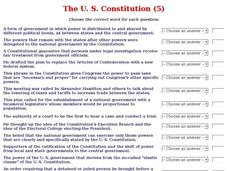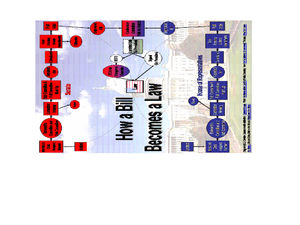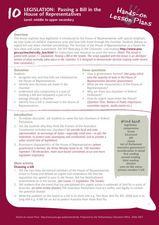Curated OER
The U. S. Constitution (5)
In this online interactive American history worksheet, students answer 17 fill in the blank questions regarding the U. S. Constitution. Students may submit their answers to be scored.
Curated OER
Early Presidents and Politics
Students investigate early presidents of the United States. Students complete a series of lessons in which they research the contributions and political climate during the terms of U.S. presidents from George Washington to Andrew Jackson.
Curated OER
Senate Judiciary Committee Confirmation Simulation
Students research the Supreme Court judicial selection process while role playing. They examine the political nature of the process and discuss merits of Supreme Court nominees.
Curated OER
Zen and the Art of Murder
Students describe the importance of citizen involvement in the judicial system. They play the role of a witness to a crime scene by watching the video clip. Students discuss how differing eyewitness accounts can affect a police...
Curated OER
The Impact of Hazelwood on School Publications
Ninth graders explore the Supreme Court Case Hazelwood School District v. Kuhlmeier. In this American Government lesson, 9th graders research the recent history of censorship and how the courts have been involved in either...
Curated OER
Just how broken is the Senate?
Twelfth graders examine the role of the Senate in the United States. In this American Government lesson, 12th graders read various articles and answer questions to these articles. Students write a letter to their Senator on a...
Curated OER
Federalism and the Prevention of Abuse of Power in the US Federal Government
Fourth graders stud Federalism and identify examples of abuse of power.
Curated OER
The U. S. Constitution (3)
In this online interactive American history worksheet, students answer 10 multiple choice questions regarding the early U. S. Constitution. Students may submit their answers to be scored.
Curated OER
How Government Works and the Rights of the People
Eighth graders identify how to be responsible citizens. In this civics lesson, 8th graders review websites of congressional members and then create questionnaires about the responsibilities of citizens.
Judicial Learning Center
The Constitution
Supreme Court justices debate the meaning of the US Constitution, but we expect teachers to explain it to scholars with far less training and experience. A daunting task for sure, but it's not insurmountable with resources that simplify...
Jeopardy Labs
Third Grade Social Studies Review
In this interactive JeopardyLab game, with the assistance of a teacher, students can play against each other or in teams to review the content of Third Grade Social Studies. Allow the first team to choose a topic and a point value for a...
Ohio Center For Law-Related Education
Four Activities: Thurgood Marshall and the Nomination and Confirmation of Federal Judges
The process of nominating and confirming federal judges can sound like a lot of bureaucratic hoops, but a resource breaks down the steps of the Supreme Court nominations in a simpler manner. Learners participate in four activities that...
Judicial Learning Center
The Power of Judicial Review
Marbury v. Madison is arguably the most important landmark case in the history of the Supreme Court. A fact-filled lesson provides background information about the case and two others related to the concept of judicial review. Scholars...
Curated OER
American History Through the Len of the Supreme Court Decisions
Students examine the historical background of Supreme Court decisions and the basic principles behind legislation. As part of the lesson, students discover legal concepts and terms and write sentences using the vocabulary they have...
Judicial Learning Center
Judicial Independence
Most people support the idea of an independent judiciary in theory until they hear about a court case that violates their principles. An informative resource explains why the concept is important. It also provides scholars of criminology...
Judicial Learning Center
About Federal Judges
Not just anybody can do the job of a federal judge, but according to the United States Constitution just about anybody can be appointed. The lesson outlines the process and requirements for becoming a federal judge, focusing on the...
Judicial Learning Center
Types of Court Cases
How can one court acquit someone of a crime, while another convicts the person of the same one? It's all because of the differences between civil and criminal trials. An informative resource provides scholars in the field of criminology...
Administrative Office of the US Courts
US v. Alvarez
Is it illegal to lie about military service? Discuss the ways the First Amendment affects the Stolen Valor Act with a lesson that focuses on the Supreme Court case U.S. v. Alvarez. As high schoolers learn more about the history of the...
Curated OER
The Supreme Court: The Judicial Power of the United States
Students investigate some basic facts about the Supreme Court by examining the United States Constitution and one of the landmark cases decided by that court. The operation of the Supreme Court forms the focus of the lesson.
Curated OER
Legislation: Passing a Bill in the House of Representatives
Students study the concept of legislation as it relates to passing a bill in the House of Representatives. In this legislation: passing a bill in the house of representative lesson plan, students identify why and how bills are introduced...
Judicial Learning Center
The Players in the Courtroom
Courtrooms are complicated. In addition to the many rules, there are a number of people whose jobs are not very clear to the casual courtroom observer. With the resource, individuals identify some of these roles and review more...
Judicial Learning Center
The Ratification Debate
Most Americans profess their love for the US Constitution, but this was not always the case. An informative lesson overviews the debate between the Federalists and Anti-Federalists by summarizing the main arguments of each side. It...
Judicial Learning Center
Article III and the Courts
What's the best way to make sense of the Constitution? A helpful lesson contains both the text of Article III and annotation of each of its sections, breaking it down into easy-to-understand parts. It also includes links to a...
C-SPAN
How A Bill Becomes A Law
Seven steps are required for a bill to become a United States law. The Families First Coronavirus Response Act (H.R. 6201) is used as a model for the process of how a bill becomes a law. Class members work independently through a...
Other popular searches
- Branches of Government
- Three Branches of Government
- 3 Branches of Government
- Branches of Government Chart
- Branches of u.s. Government
- Branches of Us Government
- The Branches of Government
- U.s. Government (Branches)
- Us Government Branches
- Federal Government Branches
- State Branches of Government
- Branches of Federal Government























